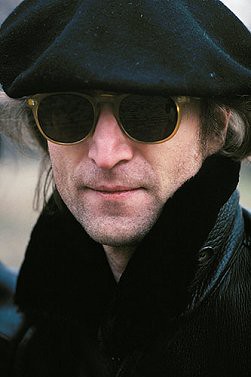 This evening 30 years ago, John Lennon was shot dead — a shock end to an era.
This evening 30 years ago, John Lennon was shot dead — a shock end to an era.
In this an iconic anniversary for an icon, a lot of media attention will focus on Lennon’s years as a Beatle, but at the time of his death, he stood alone, a solo musical performer, and, to the US government, a national security risk. (Read a mash-up of Lennon and WikiLeaks’ Julian Assange here).
From Lennon’s last print interview: “What they want is dead heroes, like Sid Vicious and James Dean…I’m not interested in being a dead fuckin’ hero … so forget ’em, forget ’em.” (And a return to touring). “We just might do it, but there will be no smoke bombs, no lipstick, no flashing lights. It just has to be comfy. But we could have a laugh. We’re born-again rockers, and we’re starting over … There’s plenty of time, right? Plenty of time.”
(Illustration found here).
Reportedly, that last interview — conducted Dec. 5, 1980 — will be published for the first time this Friday by Rolling Stone magazine.
The above blurb came from Reuters news service.
Lennon was a major player in the revolution of the 1960s — even more so after the Beatles became history.
Coincidentally, just a bit more than a month before Lennon’s death, Ronald Reagan was elected president and ushered in the end — all the 1960s protests, songs and chaos were finished and life would at first grind slowly, then gather speed over the years to culminate in the horror that’s nowadays.
In Lennon, though, there was always hope.
And with the Beatles — a place in the sun for nerdy, nit-witted teenagers like myself (among millions and millions of others).
I never saw the boys live in concert, but the first viewing of their first film, ‘A Hard Day’s Night,’ was as close to the massive-adrenaline rush supposedly encountered when the Beatles jammed on a stage.
The little movie theater on Florida’s panhandle circa July 1964 was packed to the very gills with teenagers, including a shitload of screaming female teenagers — every time Paul appeared on screen, a horrendous screaming melee — and with the boys’ Liverpool accent, the dialogue was sometimes extremely hard to follow.
Who really gave a shit — it was an experience still vividly remembered nearly 50 years later.
This little scene from the ‘Hard Day’s Night’ script has always seemed to me the illustrative moment where angry youth clashed with a stodgy, loser generation.
And copped Lennon’s attitude toward authority — his straight-faced, eye-to-eye command, “Give us a kiss,” reflected giving peace a chance later on, and National Guard flower power during 60s demonstrations.
Peace never really got a fair shake.
(Older, agitated train passenger sitting with four smart-ass, quick-witted youngsters)
Hello. Morning.
All right.
Do you mind if we have it open?Yes, I do.
Four of us want it open, if it’s all the same to you.It isn’t. I travel on this train regularly twice a week……so I suppose I have some rights.
So have we.
We’ll have that thing off as well.
Knowledge of the Railway Acts tell you I’m within my rights.But we want to hear it. We’re a community, majority vote, up the workers and all that stuff.
Then I suggest you take that damn thing into the corridor……or some other part of the train where you obviously belong.
Give us a kiss.
Look, we paid for our seats too, you know.
I travel on this train regularly, twice a week.
Knock it off, Paul. You can’t win with his sort.
After all, it’s his train.
Isn’t it, mister?And don’t take that tone with me, young man.
I fought the war for your sort.I bet you’re sorry you won.
I shall call the guard.
Ah, but what?
They don’t take kindly to insults, you know.
Let’s go have some coffee and leave
the kennel to Lassie.Hey, mister, can we have our ball back?
Look, mister, Mister, can we have our ball back?
Generations clashing in a historical place so far, far away and so freakin’ long, long ago it seems now just a fantasy.